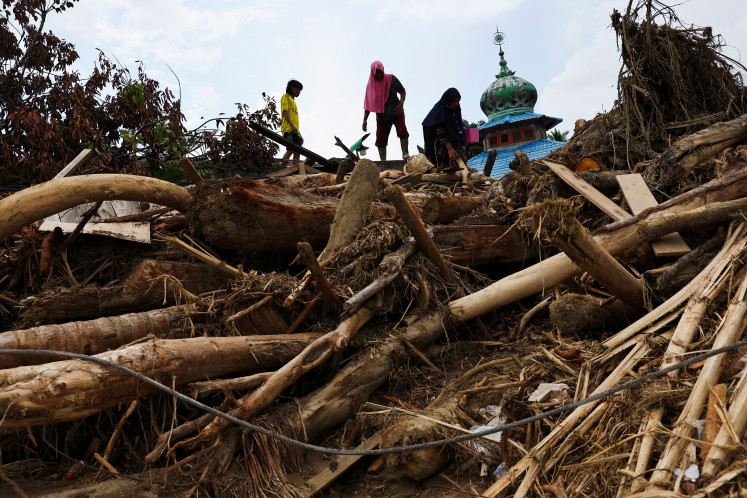Popular Reads
Top Results
Can't find what you're looking for?
View all search resultsPopular Reads
Top Results
Can't find what you're looking for?
View all search resultsHuman rights and Internet governance
Bali is hosting another world-scale conference, the Internet Governance Forum (IGF), from Oct
Change text size
Gift Premium Articles
to Anyone
B
ali is hosting another world-scale conference, the Internet Governance Forum (IGF), from Oct. 22 to 25. The IGF may sound less merrier than the Asia-Pacific Economic Cooperation (APEC) Summit earlier this month, but it is obviously important for Indonesia, home to 63 million frequent Internet users.
The IGF, which is basically the world's biggest Internet-policy event, will gather stakeholders representing states, the private sector and civil society. The forum is a perfect moment to discuss the link between Internet usage and freedom of speech and expression.
Internet governance is a big, complicated and ambiguous matter. The phrase was coined during the World Summit on the Information Society (WSIS) 2005 in Tunisia and is described as 'the development and application by governments, the private sector and civil society, in their respective roles, of shared principles, norms, rules, decision-making procedures and programs that shape the evolution and use of the Internet' (Mathiason, 2009: 18). The initial agreement reached on Internet governance is followed with a regular forum, the IGF, to discuss Internet-related matters.
According to United Nations (UN) High Commissioner for Human Rights, Navi Pillay, the Internet is the strongest global trend and has created very complex challenges for human rights. The Internet has put an end to the era of information and news monopolies and encouraged accountable and transparent decision-making processes.
The UN's concern for the role of the Internet in connection to human rights first emerged in 1997 with UN Commission on Human Rights Resolution No. 27/1997, which mandates the UN Special Rapporteur on the Promotion and Protection of the Right to Freedom of Opinion and Expression to analyze the effects of new information technology on the equal access of information and the enjoyment of freedom of expression.
Ever since, the discourse on the Internet and human rights has developed, resulting in the resolution of the UN Commission on Human Rights in June 2012 on the promotion, protection and enjoyment of human rights on the Internet, which declares that access to the Internet is a human right.
The rapid growth of Internet users has opened many opportunities. In line with previous reports, UN Special Rapporteur on the Promotion and Protection of the Right to Freedom of Opinion and Expression Frank La Rue said in 2011 that the Internet has become an essential tool to uphold human rights, eradicate injustice and foster human development. Therefore, seeking to ensure that everyone has equal access to the Internet has to be a priority for all countries.
Particularly on the IGF, UN Special Raporteur Ambeyi Lagabo said in 2006 that cooperation among multiple stakeholders was crucial. That was the only way to make sure that human rights became the most fundamental and undeniable component of future Internet governance.
Unequal access is obviously Indonesia's biggest problem related to Internet technology. Internet access can only be found in big cities, especially on Java, where Internet penetration reached 57 percent of the population in 2012.
The Communications and Information Ministry has tried to tackle this gap by expanding the network through the Palapa Ring project and developing supporting infrastructures through the Universal Service Obligation (USO).
The infrastructure gap is not the only main obstacle the country faces on Internet governance. Article 27 section 3 of the Information and Electronic Transaction Law on online defamation, despite its unclear terms and definition, has put some people, especially social media users, behind bars.
The first defamation case that involved an Internet user was in 2010 when Prita Mulyasari, a housewife, was detained after being accused of defaming a hospital through an email. The country has also seen some Facebook and Twitter users reported to the police, and even sent to prison, for what they've said online.
This draconian law was taken to the Constitutional Court for judicial review, only to be rejected by the justices, who said it was necessary to regulate online defamation. According to the court, defamation provisions in the Criminal Code cannot reach defamation in cyberspace. Instead of regulating, the law has had a chilling effect on freedom of speech and expression in the country.
Another problem is Communications and Information Ministry's one-sided effort to block and filter Internet content, claiming to protect children from pornography. The ministry has launched a new program called Trust Positive (Trust+), which basically creates a database of websites suspected of having pornographic content or that run against the country's moral values. Despite its noble intention, the Trust+ sometimes fails to identify which sites are pornographic, and has blocked the websites of organizations supporting LGBT (lesbian, gay, bisexual and transgender) rights.
In fact, blocking and filtering content on the Internet amounts to a restriction on freedom of expression. Blocking and filtering can be justified only after the government follows the due process of the legal mechanism. The existing law in Indonesia, unfortunately, does not recognize a mechanism for complaints and reparations.
Another piece of unfinished business is the responsibility to strengthen the protection of privacy, including our private data. Some of the country's laws authorize state agencies to conduct surveillance on and wiretap citizens. The unclear and overlapped regulations, combined with the absence of a mechanism for redress, render our secure data vulnerable.
When it comes to the regulation of personal data protection, Indonesia lags behind ASEAN neighbors. Private information in the country is easily distributed and openly shared without the owner's consent, as happens in the banking industry.
In years ahead, Indonesia will face more problems related to Internet governance, such as clarifying regulations for Internet service providers, blocking access on the grounds of intellectual property rights and net-neutrality.
To manage those matters, it is important that the government takes into account human rights values as the basis for the future of Internet governance.
The writer is a researcher and the human rights advocate at the Institute for Policy Research and Advocacy (ELSAM), Jakarta.










